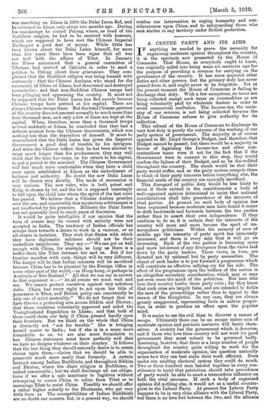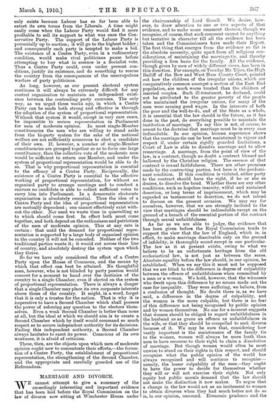A CENTRE PARTY AND ITS AIMS.
Ianything be needed to prove the necessity for organising moderate opinion throughout the country, it is the spectacle now presented by the House of Commons. That House, as everybody ought to know, was originally called into being some six centuries ago for the purpose of providing a revenue for carrying on the government of the country. It has since acquired other duties and other powers, but the primary duty has never passed from it, and ought never to be forgotten. Yet at the present moment the House of Commons is failing to discharge that duty. With a few exceptions, no taxes are being collected except such taxes on commodities as are being voluntarily paid by wholesale dealers in order to avoid commercial confusion. The Income-tax, the main- stay of our revenue, is not being collected because the House of Commons refuses to give authority for its collection.
This refusal of the House of Commons to discharge its very first duty is purely the outcome of the working of our party system of government. The majority is of course opposed to Mr. Lloyd George's Budget, and therefore that Budget cannot be passed; but there would be a majority in favour of legalising the Income-tax and other non- contentions taxes were it not for the fact that if the Government were to consent to this step, they would confess the failure of their Budget, and so be discredited throughout the country. The result would be that their party would suffer, and as the party system compels them to think of their party interests before everything else, the financial needs of the country are cynically sacrificed. This disregard of public duty would be less likely to occur if there existed in the constituencies a body of well-organised opinion determined to insist that national considerations shall take precedence of the interests of rival parties. At present no such body of opinion has been organised because moderate men have found it easier to drift backwards and forwards between the two parties rather than to assert their own independence. If they continue to do so, it is certain that the interests of the country will more and more become the sport of un- scrupulous politicians. Within the memory of men of middle age the intensity of party spirit has immensely increased, and there is every sign that it will go on increasing. Each of the two parties is becoming more and more intolerant of any divergence from the views laid down by the party leaders. These views, in turn, are dictated not by national but by party necessities. The object of each leader is to put forward a programme which will constitute an effective rallying cry for his side. The effect of the programme upon the welfare of the nation is an altogether secondary consideration, which may or may not even cross the mind of the politician. But men who love their country loathe these party cries ; for they know that such cries are largely false, and are intended to tickle the ears of the groundlings rather than to appeal to the reason of the thoughtful. In any case, they are always grossly exaggerated, representing facts in untrue propor- tion in order to produce an effect upon the popular mind.
It is easier to see the evil than to discover a means of escape. Ultimately there can be no escape unless men of moderate opinion and patriotic instincts will bestir them- selves. A country has the government which it deserves, and if those who love their country will not work for good government they must submit to be governed badly. Assuming, however, that there is a large number of people throughout the country quite willing to work for the organisation of moderate opinion, the question naturally arises how they can best make their work efficient. Even under our existing electoral system they could do much. Two or three hundred men banded together in every con- stituency to insist that patriotism should take precedence of party would be able to exert a tremendous influence on both the rival caucuses. If such a body of organised opinion did nothing else, it would act as a useful counter- poise to the Labour Party. At present the Labour Party happens to be in very close alliance with the Liberal Party, but there is no love lost between the two, and the alliance only exists because Labour has so far been able to extort its own terms from the Liberals. A time might easily come when the Labour Party would find it more profitable to sell its support to what was once the Con- servative Party. The support of the Labour Party is perennially up to auction; it will go to the highest bidder ; and consequently each party is tempted to make a bid. The existence of a Centre Party, even in a rudimentary condition, would make rival politicians pause before attempting to buy what in essence is a Socialist vote. Thus a Centre Party could, even under present con- ditions, justify its existence, and do something to rescue the country from the consequences of the unscrupulous warfare of party politicians.
As long, however, as our present electoral system continues it will always be extremely difficult for any central organisation to maintain an independent exist- ence between the contending party caucuses. The only way, as we urged three weeks ago, in which a Centre Party can be made both strong and effective is through the adoption of the system of proportional representation. Without that system it would, except in very rare cases, be impossible to secure representation in Parliament for men of moderate opinion. In most single-Member constituencies the men who are willing to stand aside from the bi-party system for the sake of the national welfare are not sufficiently numerous to elect a candidate of their own. If, however, a number of single-Member constituencies are grouped together so as to form one large constituency, then the collective vote of the moderate men would be sufficient to return one Member, and under the system of proportional representation would be able to do so. That is why proportional representation is essential to the efficacy of a Centre Party. Reciprocally, the existence of a Centre Party is essential to the effective working of proportional representation, for without an organised party to arrange meetings and to conduct a canvass no candidate is able to collect sufficient votes to carry him into Parliament. In a democratic electorate organisation is absolutely essential. Thus the idea of a Centre Party and the idea of proportional representation are mutually dependent ; one cannot effectively exist with- out the other. Nor need we waste time in quarrelling as to which should come first. In effect both must come together, and both depend on the enthusiasm and patriotism of the men of moderate opinion. This at any rate is certain : that until the demand for proportional repre- sentation is supported by a large body of organised opinion in the country it will not be conceded. Neither of the two traditional parties wants it; it would cut across their line of country, and absolutely destroy the system upon which they thrive.
So far we have only considered the effect of a Centre Party upon the House of Commons, and the means by which that effect can best be attained. No thoughtful man, however, who is not blinded by party passion would consent for a moment to hand over the destinies of the country to a single Chamber, even if elected on the system of proportional representation. There is always a danger that a single Chamber may place its own corporate interests above those of the country. It might, in a word, forget that it is only a trustee for the nation. That is why it is imperative to have a Second Chamber which shall possess the power of referring any question to the electors them- selves. Even a weak Second Chamber is better than none at all, but the ideal at which we should aim is to create a Second Chamber which by itself would command so much respect as to secure independent authority for its decisions. Failing this independent authority, a Second Chamber always hesitates to exert its power. Conscious of its own weakness, it is afraid of criticism.
These, then, are the objects upon which men of moderate opinion ought now to concentrate their efforts,—the forma- tion of a Centre Party, the establishment of proportional representation, the strengthening of the Second Chamber, and the appropriate and carefully guarded use of the Referendum.















































 Previous page
Previous page